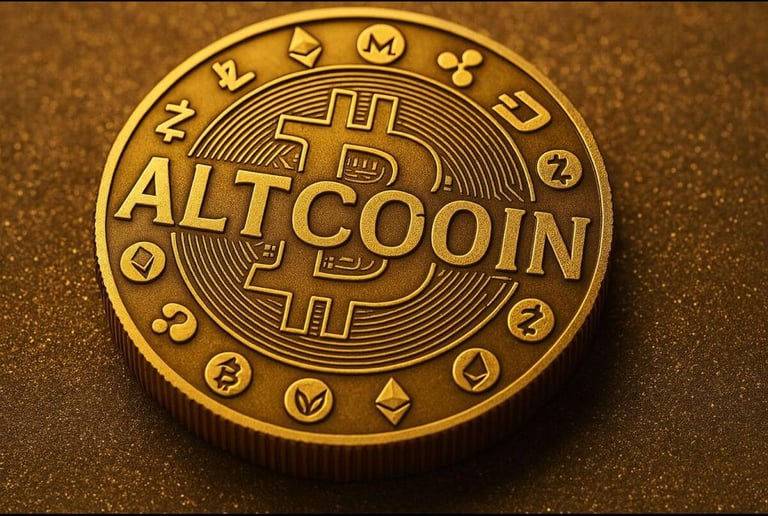Understanding Cryptocurrency Altcoins: A Comprehensive Guide
7/9/20255 min read


What are Altcoins and Their Types
Altcoins, short for "alternative coins," are any cryptocurrencies other than Bitcoin. These digital currencies were created in response to Bitcoin's popularity, often aiming to improve upon its design or address specific limitations. While Bitcoin remains the most widely recognized and utilized cryptocurrency, the growing market of altcoins plays a significant role in the broader cryptocurrency ecosystem, catering to diverse use cases and functionalities.
There are several categories of altcoins, each designed with different purposes and mechanisms. One major type is tokens, which are built on existing blockchain networks rather than their own. Tokens can serve various functions, such as facilitating transactions within a specific platform or representing assets. An example of a popular token is Ethereum (ETH), which enables the execution of smart contracts and decentralized applications (DApps).
Stablecoins represent another important category of altcoins. They are designed to maintain a stable value by pegging their price to a reserve asset, such as a fiat currency or commodity. This stability allows stablecoins to serve as a reliable medium of exchange and a store of value. Tether (USDT) and USD Coin (USDC) are two well-known stablecoins, commonly utilized in trading and investment transactions.
Utility tokens are a distinct group of altcoins that provide users with access to a product or service within a particular project or ecosystem. These tokens incentivize behaviors within the platform and can often be used for transactions, thus driving user engagement. Examples include Binance Coin (BNB), which is utilized for trading fee discounts on the Binance platform, and Chainlink (LINK), which enables the use of real-world data in smart contracts.
Finally, privacy coins focus on offering enhanced anonymity features for transactions. Unlike traditional cryptocurrencies that can expose transaction histories, privacy coins such as Monero (XMR) and Zcash (ZEC) employ advanced cryptographic techniques to ensure the privacy of users. This category plays a vital role in providing secure and confidential transaction options in the cryptocurrency landscape.
Real-World Use Cases for Altcoins
Altcoins have increasingly found their footing in various practical applications across multiple sectors. While Bitcoin is often the first point of contact for enthusiasts and investors alike, numerous altcoins are designed to meet specific needs and improve functionalities. One prominent example is the use of altcoins for online transactions. Several e-commerce platforms and service providers now accept altcoins as a viable payment method. Ethereum, Litecoin, and Ripple are among the popular choices for these transactions, allowing for quicker processing times and lower fees compared to traditional payment systems.
Furthermore, decentralized finance (DeFi) platforms have surged in popularity, highlighting the utility of specific altcoins. DeFi aims to recreate traditional financial systems—like lending, borrowing, and trading—using blockchain technology, and many altcoins serve critical roles within these ecosystems. For instance, DAI, a stablecoin that maintains its value against the USD, is frequently used in DeFi protocols for maintaining price stability while allowing users to lend or borrow assets without centralized authority involvement. This growing sector underlines how altcoins can offer innovative alternatives to conventional financial services.
Moreover, the rise of smart contracts, notably facilitated by Ethereum, showcases another significant application of altcoins. Smart contracts enable agreements to be executed automatically when predefined conditions are met, reducing the need for intermediaries. They have practical applications in various industries, including real estate, logistics, and supply chain management, showcasing altcoins' adaptability and potential for streamlining operations. Case studies illustrate companies leveraging altcoins for these purposes, emphasizing their real-world utility and enhancing credibility in businesses’ operational frameworks.
Thus, as adoption continues to grow, altcoins are proving to be more than just speculative assets; they serve substantial functions in the evolving financial landscape, enhancing both individual and business transactions.
The Future of Altcoins: Trends and Predictions
The altcoin market has shown remarkable growth and diversification, driven by various key factors. As we look towards the future, it is essential to consider ongoing trends and potential developments that will shape the environment for altcoins in the coming years. One significant influence is regulatory environments. Governments around the globe are increasingly focusing on creating regulations that will govern cryptocurrencies. These regulations may enhance investor protection and market stability, which could lead to greater institutional adoption of altcoins. In particular, consistent and transparent regulatory frameworks are anticipated to provide a clearer pathway for innovation while mitigating risks associated with illicit activities.
Technological advancements are another critical factor influencing the future of altcoins. The rise of decentralized finance (DeFi) platforms and non-fungible tokens (NFTs) has propelled many altcoins into the spotlight, expanding their use cases. Continued technological innovations, such as advancements in blockchain scaling solutions, will likely enhance transaction speeds and lower costs, making altcoins more accessible and appealing to a broader audience. Furthermore, interoperability among different blockchain networks may emerge as a key trend, fostering collaboration and benefiting the overall ecosystem.
Market demand remains a central pillar driving the evolution of altcoins. As more investors seek diversification outside of Bitcoin, altcoins are poised to capture attention due to their potential for high returns and unique value propositions. Additionally, the increasing interest of retail investors and traditional financial institutions may lead to the development of new altcoin projects aiming to fulfill specific market needs or niches. Understanding these dynamics will be crucial for investors looking to capitalize on future opportunities in this rapidly changing landscape.
Getting Started with Altcoin Trading: Your First Step
Entering the world of altcoin trading can be both exciting and overwhelming for newcomers. As the cryptocurrency landscape evolves, many investors seek opportunities beyond Bitcoin, and altcoins have emerged as significant alternatives. To embark on your journey, it is crucial to understand the fundamentals of altcoin trading. Here are some essential tips and strategies to guide you in this process.
First and foremost, select a reliable trading platform. The security and reputation of the platform are paramount; therefore, conducting thorough research to find trustworthy exchanges is necessary. Look for platforms that offer user-friendly interfaces, robust security measures, and responsive customer support, as these features will enhance your overall trading experience. Additionally, ensure the platform supports a range of altcoins, providing you with a variety of options to invest in.
Once you have chosen your trading platform, it is vital to learn the basics of market analysis. Familiarize yourself with both fundamental and technical analysis, which are essential tools for making informed decisions. Fundamental analysis involves assessing the technology and team behind each altcoin, while technical analysis focuses on price charts and historical data to identify trends. Understanding these will help you navigate the volatility inherent in the altcoin market.
Incorporating risk management strategies into your trading plan is equally essential. Set clear profit targets and stop-loss orders to protect your investments. This approach minimizes the impact of market fluctuations and can help prevent significant losses. Furthermore, starting with small investments allows you to gain experience without exposing yourself to excessive risk.
Finally, stay updated with the latest news and developments in the crypto space. Engaging with other traders and participating in online forums can enhance your knowledge and provide valuable insights. As you begin your altcoin journey, we encourage you to explore GO AI-ACADEMY as a gateway into the world of cryptocurrency trading and investing.
EconoTrade Insights
Learn. Trade. Grow.
Empowering financial freedom through smart education and trusted tools.
© 2025 ECONO TRADE INSIGHTS. All rights reserved.
About - https://econotradeinsights.com/about-us-financial-blogging
Contact - econotradeinsights@gmail.com
Disclaimer - https://econotradeinsights.com/disclaimer
Terms & Conditions - https://econotradeinsights.com/terms-and-conditions
